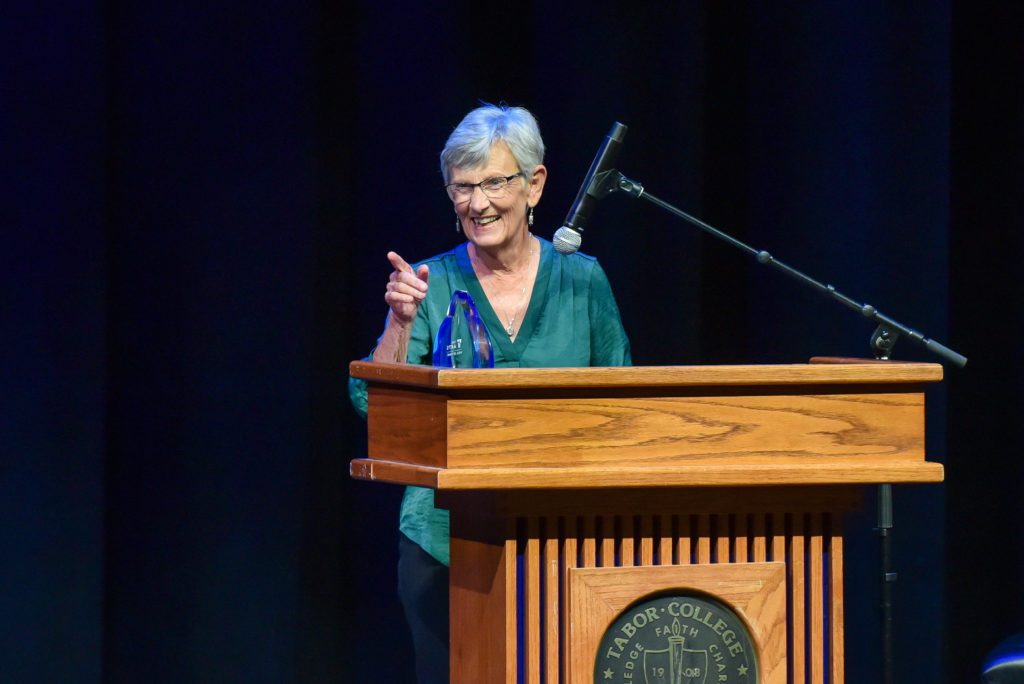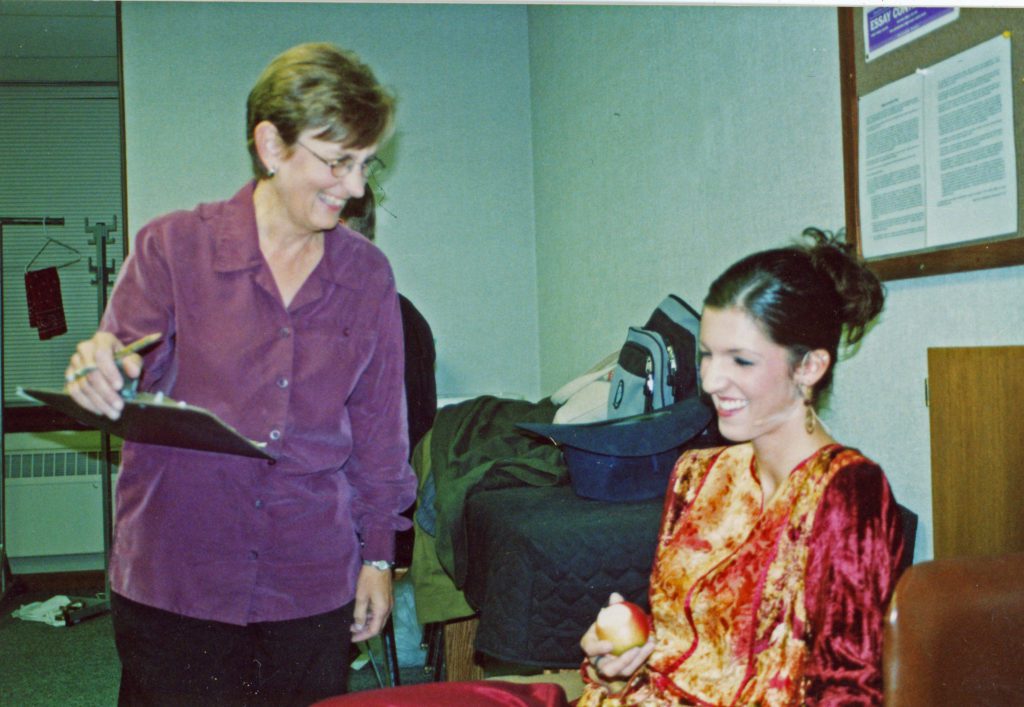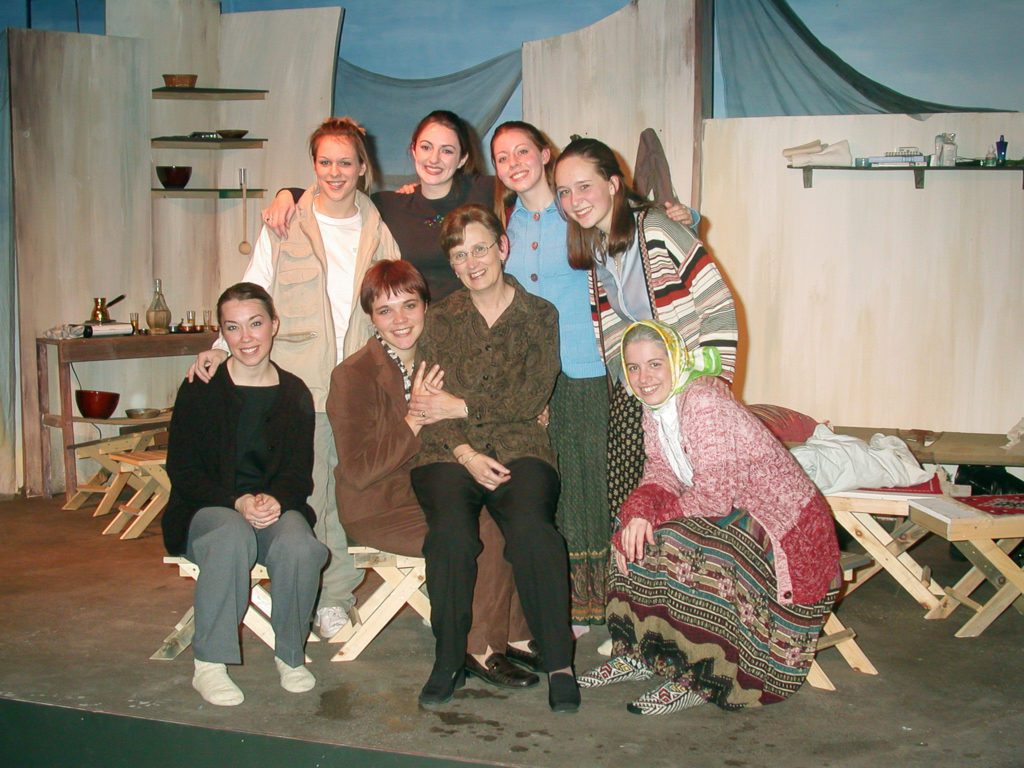
“What about those years?”
Judy (Prieb, g’68) Harder sat at home in February 2022 and pulled out photo book after photo book, marveling over that question and 100 playbills. She reflected on the people who assisted her through her tenure as director of theatre and associate professor at Tabor College.
Whether it was a love for the arts, community, music, or students, 26 years of productions fit hand-in-hand with Harder’s vision for theatre at Tabor.
A tenure worthy of recognition in the Tabor Arts Hall of Fame.
–––––––––––––––––––––
Harder recalls exploring the H.W. Lohrenz Administration Building as her father, Wes Prieb, directed his senior English class in “Oliver.” Chalk in hand, she’d draw her latest creations as she heard them rehearse and talk about the performance.
Add in her mother Lucille’s influence as a piano teacher, and an eye for art and creativity was in place in Harder’s formative years.
“They both had a love for beauty,” Harder said.
The second she stepped into middle and high school, she was diligent in practicing clarinet and piano. She performed in a handful of plays in high school and college, choosing to explore a music major in college.
Feeling like she wasn’t cut out to be a musician or music teacher, she chose to major in English at Tabor. Upon graduating, Harder and her husband, Keith (g’68), spent time in Boston, Mass., and then later moved to Elkhart, Ind., where they were leaders of a neighborhood Christian community, The Fellowship of Hope.

Returning to Hillsboro in 1986, a friend offered a word of encouragement as she explored the next steps in her career.
“‘Do something that would feed your soul. Just take some time. Just do something.’”
Harder said, “I thought to myself, ‘I think I’ll take a theatre course.’”
While earning her master’s degree at Wichita State University, she served as an adjunct in directing theatre. Her earliest directing at Tabor included the first of three productions of “Fiddler on the Roof” in the fall of 1987. She also directed two productions at Hillsboro High School alongside longtime teacher Dave Clark, including her first show, “Godspell.”
She completed her M.A.C. in 1990, leading to her promotion to full-time assistant professor of communications. Harder taught public speaking and theatre courses while developing the Communication department at Tabor.
Whether it was her family or peers and professors Jack Braun, John McCabe-Juhnke, or Leann Toews, Harder had a support base as she dove headfirst into directing and teaching.
“I always had people cheering me on,” Harder said. “I can’t say enough about the encouragers in my life. They hired me as an adjunct to develop the Communications department. That wasn’t me, so I helped, but my love was and is theatre.”
*** *** *** *** *** *** ***
Shows at Tabor College are truly a community-wide effort.
Whether it was being able to use Hillsboro High School facilities, the construction or deconstruction of all sets, or the countless hours of practice and volunteer work behind the scenes, it was not a “one-man department.”
“In reality, it was the whole college and community that made our shows possible,” Harder said.

Harder’s eye and heart for theatre were contagious. She credited Braun, her predecessor, and then choir director Dr. Paul Wohlgemuth for holding such a high regard for arts in education.
One of her proudest accomplishments? The diversity of majors in her productions.
“I once did a count to see if we had tapped every major on campus for our casts, and we had,” Harder said.
In total, Harder directed more than 120 productions on the Tabor campus. That included repeat performances of “Fiddler on the Roof,” “Into the Woods,” “Music Man,” “Joseph & The Amazing Technicolor Dreamcoat,” and “Godspell.”
In the eye of Tabor’s 12th president, it’s a standard that was award-winning.
“One of the things I really appreciate about her is while people went to her productions to be entertained, she saw what she did as more than entertainment,” President Emeritus Larry Nikkel said. “She wanted to use that medium to provide more depth to a story. It was especially true in how she led and taught her actors. They acted not just out of spoken lines, but in empathy and insight.”
